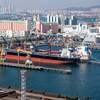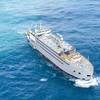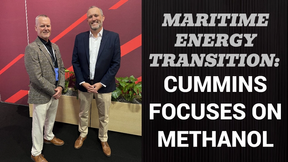Rotterdam Records Slight Drop
Dry bulk cargo
At almost 25 mln tons, coal throughput has broken the historic "coal record" of 23.7 mln tons in 1991. Although German coal imports declined in the second half of the year, they nevertheless remained the engine that is expected to continue driving this sector in the years ahead too. Around 60% of Rotterdam's coal throughput is destined for Germany. Rotterdam's share of the market in German coal imports as a whole is 40%. EECV ThyssenKrupp), EBS, EMO and the Port Management are all investing with the aim of at least maintaining this level. Throughput of ore and scrap metal are literally and figuratively highly cyclical. The fall in throughput from 45 to 39 mln tons was to be expected as a result of the decreasing demand for steel, but is nevertheless higher than anticipated 6 months ago. Prospects for ore throughput do not look too bright either for the period ahead. The slight rise in agribulk throughput is positive, given the structurally declining trend and the strong competition from other ports. Rotterdam's transshipment companies have adjusted their market approach and this seems to be bearing fruit: from 10.7 to 10.9 mln tons. 500,000 fewer tons (-4.5%) of other dry bulk cargo were transshipped. The most important reason for this is the loss of artificial fertilizer production by Hydro Agri and Kemira and fertilizer transshipment by Hanno. Since they together accounted for some 500,000 tons, this means that throughput of sand, gravel and other raw minerals was more than maintained.
Liquid bulk cargo
Following the replenishment of stocks in the first half of 2001, imports of crude oil fell slightly, as a result of which the annual total remained at just over 97 million tons. In the oil products sector (petrol, diesel, kerosine etc.), there are many regional balance differences in quality/quantity. As one of the world's largest refinery centres, Rotterdam plays an important role in maintaining equilibrium. This not only takes place in Europe, but also intercontinentally, and particularly with the USA. Last year, balance traffic was fairly intensive and throughput of oil products increased by some 10% to 14 mln tons. Other liquid bulk cargo has shown a rising trend since the early eighties. The extra strong growth in 2000 and the slow-down in growth in the chemical industry in the second half of 2001 led to stabilization at 25 mln tons.
General cargo
Containerized cargo handling fell from 65 to 63 mln tons in comparison with 2000. In TEUs (20 foot units), this represented a 2.4% drop to 6.1 mln TEU (-150,000 TEU). The reason for this decline principally lies in the relocation of a substantial proportion of feeder cargo to other ports. In 2001, part of this was compensated for by the other shipping lines that handled (far) more via Rotterdam. Partly as a result of the difficulties in the container sector as a whole, it will also still take a while before the figures are structurally in the black. In order to achieve this, it is also necessary for all parties involved in container logistics to improve coordination of their work with each other and to keep a critical eye on the price/quality level. Since 1975, roll on/roll off traffic has at least tripled. The picture of a structural growth sector is confirmed by investments by all companies in the ro/ro sector: DFDS Tor Line, Stena Line, P&O NSF, Cobelfret, SCA Interforest and RCT. The 9% decrease in 2001 to 9.1 mln tons is partly due to the outbreak of Foot & Mouth Disease. Around 80% of the ro/ro cargo traffic with the United Kingdom concerns food products. Strong competition with the container lines and foreign currency fluctuations also had an impact on ro/ro volume. Following a revival at the end of last year, other general cargo once again fell sharply. Less than in the first half of the year, but still –8.5% or 700,000 tons. Imports particularly suffered with a 10% decline. Fruit is excluded from this: fruit imports are currently once again at the level of 1999, approx. 1 mln tons. While a hole was left in general cargo throughput particularly by the bankruptcy of HRS, the decline in exports of iron, steel and non-ferrous metals to the USA also played a role.













